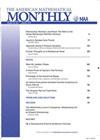公正公正分配的新视角
IF 0.4
4区 数学
Q4 MATHEMATICS
引用次数: 0
摘要
如何公平地将国会席位分配给各州已经争论了几个世纪。我们提出了另一种关于分配的观点,不是以国家为中心,而是以国家的“家庭”为中心,以具有相同整数部分的“除数法”配额的国家集为中心。我们制定了“公正”和“无偏”的分配方法。公正的方法将相同数量的席位分配给总人口相同的州的家庭,无论一个家庭由许多人口少的州组成还是由几个人口多的州组成。无偏方法分配席位,因此,如果从同一分布中重复抽取各州,分配给每个家庭的预期席位数等于该家庭的预期除法配额。作者感谢编辑、编委会和审稿人对本文的改进提出的建议,并感谢Carlos Reyes Zgarrick对分配计算尺的说明。作者简介罗斯·海曼罗斯·海曼获得印第安纳大学物理学博士学位。他曾是物理学家、社区组织者、企业研究员、科学教师、专利分析师和数据科学家。他目前是芝加哥大学研究计算中心的格兰特解决方案架构师。他在凝聚态理论、材料科学和投票理论方面发表过学术论文。rhyman@uchicago.eduNicolaus tidemanus TIDEMAN,芝加哥大学经济学博士。他曾是哈佛大学的助理教授和总统经济顾问委员会的高级经济学家,之后转到弗吉尼亚理工大学,他现在是那里的教授。他的著作主要集中在投票理论、公共财政和经济正义方面。ntideman@vt.edu本文章由计算机程序翻译,如有差异,请以英文原文为准。
A New Perspective on Impartial and Unbiased Apportionment
AbstractHow to fairly apportion congressional seats to states has been debated for centuries. We present an alternative perspective on apportionment, centered not on states but “families” of states, sets of states with “divisor-method” quotas with the same integer part. We develop “impartial” and “unbiased” apportionment methods. Impartial methods apportion the same number of seats to families of states containing the same total population, whether a family consists of many small-population states or a few large-population states. Unbiased methods apportion seats so that if states are drawn repeatedly from the same distribution, the expected number of seats apportioned to each family equals the expected divisor-method quota for that family. ACKNOWLEDGMENTThe authors thank the editor, editorial board, and reviewers for suggestions that improved the paper, and Carlos Reyes Zgarrick for his illustration of the apportionment slide rule.Additional informationNotes on contributorsRoss HymanROSS HYMAN received his Ph.D. in physics from Indiana University. He has been a physicist, a community organizer, a corporate researcher, a science teacher, a patent analyst, and a data scientist. He is currently a Grant Solutions Architect at the Research Computing Center of the University of Chicago. He has published academic papers in condensed matter theory, materials science, and voting theory. rhyman@uchicago.eduNicolaus TidemanNICOLAUS TIDEMAN received his Ph.D. in economics from the University of Chicago. He was an Assistant Professor at Harvard University and a Senior Staff Economist at the President’s Council of Economic Advisors before moving to Virginia Tech, where he is now a Professor. He publishes primarily in voting theory, public finance, and economic justice. ntideman@vt.edu
求助全文
通过发布文献求助,成功后即可免费获取论文全文。
去求助
来源期刊

American Mathematical Monthly
Mathematics-General Mathematics
CiteScore
0.80
自引率
20.00%
发文量
127
审稿时长
6-12 weeks
期刊介绍:
The Monthly''s readers expect a high standard of exposition; they look for articles that inform, stimulate, challenge, enlighten, and even entertain. Monthly articles are meant to be read, enjoyed, and discussed, rather than just archived. Articles may be expositions of old or new results, historical or biographical essays, speculations or definitive treatments, broad developments, or explorations of a single application. Novelty and generality are far less important than clarity of exposition and broad appeal. Appropriate figures, diagrams, and photographs are encouraged.
Notes are short, sharply focused, and possibly informal. They are often gems that provide a new proof of an old theorem, a novel presentation of a familiar theme, or a lively discussion of a single issue.
Abstracts for articles or notes should entice the prospective reader into exploring the subject of the paper and should make it clear to the reader why this paper is interesting and important. The abstract should highlight the concepts of the paper rather than summarize the mechanics. The abstract is the first impression of the paper, not a technical summary of the paper. Excessive use of notation is discouraged as it can limit the interest of the broad readership of the MAA, and can limit search-ability of the article.
 求助内容:
求助内容: 应助结果提醒方式:
应助结果提醒方式:


